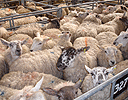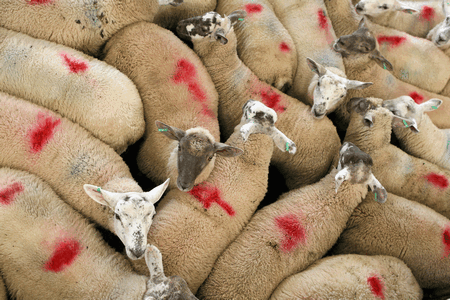Bluetongue nightmare for sheep sales

The British Charollais Sheep Society’s premier ram sale – to be held at Worcester tomorrow, 28 June – fires the starting gun for a breeding sheep selling season that will run into November.
But already it’s being described as nightmarish by those trying to organise sales that are under constant risk of falling foul of DEFRA’s changes to bluetongue area designations.
Carroll Barber, Charollais society secretary, says bluetongue restrictions are already preventing breeders selling at either Worcester or the breed’s second sale, to be held at Welshpool on 7 July.
“It’s fairly nightmarish, but if we start postponing sales it will only makes things worse. This is a critical time for our breeders to buy and sell rams. In terms of disease protection and protocol there doesn’t seem to be any reason for not making the whole of the UK a bluetongue zone.”
At the Suffolk society’s office at Malvern, breed secretary Penny Lawrence says breeders are under a lot of pressure trying to work out where and when they can buy and sell.
“It’s incredibly complicated and the on-going area status changes make it impossible to plan. What the sheep sector can’t afford is another year like 2007,” she says.

This year’s main Suffolk ram sale at Shrewsbury has been postponed for three weeks and will now be held on 9 August, although several leading vendors will not be present.
Ron Wilson, who runs Border Union’s Kelso ram sales, is already well ahead with plans to stage this year’s sale at two venues – Kelso and Hexham. He describes the situation as one of “ifs, buts and whens”.
“It’s difficult to plan because things keep changing. We mustn’t have the level of disruption to sales that we had last year and there’s no reason why we should. But the UK is an island and we should be tackling bluetongue nationally, not in a devolved way. If we had one zone we could work with that to everyone’s benefit.”
The current plan is to hold the main sale at Kelso on 12 September with another sale the following day at Hexham, Northumberland.
Sales affected
While no one is anticipating the bluetongue situation will lead to the cancellation of sales that caused such catastrophic implications for the breeding sheep market last year, the big mid-summer breeding ewe sales have already been affected – although it may well help rather then hinder the trade.
Simon Draper of Thame market, venue for Bicester Sheep Fair, says the decision has been taken to stagger the event and hold sales every two weeks during August offering about 4000-5000 sheep at each.
“It’s the only way we could help lowland vendors vaccinate and be able to move sheep after 60 days. But I don’t think it will be bad for the trade – in fact it might help it. Some of these theaves will have a few more weeks to put some flesh on, so they should look better for it,” explains Mr Draper.
Organising a full calendar of sale fixtures for Harrison and Hetherington’s autumn season is never an easy job even under normal trading circumstances but this year’s ever-changing bluetongue regulations isn’t making life any easier.
“We keep waiting for more detail from DEFRA. The whole situation is very woolly and it makes it impossible to be specific about sale dates and venues.
“A lot will depend on what happens above the borderline between Scotland and England, but it’s a real guessing game at the moment,” says operations director David Pritchard.
Like all auctioneers he’s urging DEFRA to acknowledge the need for the sheep sector to move vast numbers of stock in the coming months and not to leave decisions so late that serious disruption will mean yet another autumn fraught with marketing problems for producers.
“We’ll be as flexible as we can be to enable buyers and sellers to cope with movement regulations, but the sooner we know DEFRA’s plans for the autumn the better it will be for the whole sheep sector,” adds Mr Pritchard.
